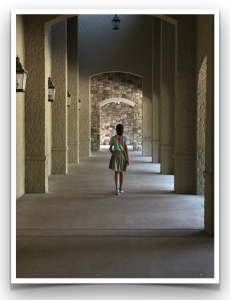 I have very few memories of showing anyone my report card during my school years. No one checked that I did my homework or studied for a test. It wasn’t due to a lack of interest in my academic success. My family understood the importance of a quality education, and we lived in a neighborhood that provided the best public education available in the city. Grades in school were simply not their measure of success.
I have very few memories of showing anyone my report card during my school years. No one checked that I did my homework or studied for a test. It wasn’t due to a lack of interest in my academic success. My family understood the importance of a quality education, and we lived in a neighborhood that provided the best public education available in the city. Grades in school were simply not their measure of success.
I do remember many talks with my family about making good choices – choices about who I considered a friend (because the answer to their question of “Who are their people?” when I mentioned a new name provided my family with all they needed to know about this person; choices in how I presented myself to others (because respect and decency came before anything else); and choices about what I did with my time (I still hear my grandmother saying “Make sure you do something with yourself.”). It was always clear to me that people make choices in life, and I was called to reflect on mine regularly.
My family collectively worked to provide me with opportunities, modeled and explicitly taught what they believed were core character traits and habits of mind, and they regularly expressed their faith in me to be my best self. The message of faith was so prevalent that it transferred to me, and I developed faith in myself.
My family’s faith built my confidence by reminding me of the skills, abilities, and accomplishments I’d worked to attain. It caused me to set goals for myself and develop a sense of responsibility. It motivated me to work through difficulties and setbacks so I could live up to the expectations that they set for me and I adopted for myself.
As parents and educators, we work to provide children with the best learning experiences and opportunities we can provide. We strive to cultivate curious, lifelong learners and often find ourselves wondering what more we can do to prepare our children to be thoughtful, contributing members of society. This question persists in my mind as a school administrator and parent of two teenagers.
As I was thinking about my grandmother recently I found myself wondering, what would happen if we were more intentional about passing along our faith to children – to our own and other’s? I don’t mean shallow praise or fleeting compliments but empowering messages of belief and expectation.
What if we shared our faith in them and their abilities, imploring them to believe in their own worth and beauty in spite of what others may say about them? What would come of regularly reminding children of the skills they have developed and the knowledge they have acquired, encouraging them to stand firmly on their past efforts and accomplishments? What about deliberately coaching them to look to examples of those who came before them as evidence of what is possible and as motivation to persevere when times are hard? Would it build them up inside?
Then, what if we made it clear to them that our faith is not hope alone but is coupled with expectation and a history of planning, preparation, and sacrifice? How would they feel about a warning that we’ll be trusting them to do something with themselves – something greater for all of us. What if our words and actions taught them that life is full of choices and then we gave them some to practice so they would know for themselves. Would this promote a sense of responsibility and agency?
Research on locus of control and the Adlerian theory were not on my family’s reading list. Yet the ideas of choice and autonomy promoting motivation (internal locus of control) and the need for a sense of belonging along with contribution (Positive Discipline) resonate with me as a critical part of my childhood experience. Since these practices shaped me so strongly, I will use them more intentionally in my own parenting and teaching practices. However, please note that I will continue to check progress reports.
Learner, Thinker, Writer: Rhonda Mitchell serves Trinity School as Early Elementary Division Head.
Believing in and recognizing the “fullest” potential is a gift to our students. And them knowing it, empowers them to reach even further! Nice post Rhonda!
Thank you for sharing such a well-written, thoughtful piece. I got a huge chuckle out of the last line! 🙂 More importantly, I feel like your words were a gentle reminder to this mom of a kindergartner that I should continually talk to her about choices and allow her to make her own (especially when the stakes are lower — whether or not I like her choice — so that she makes good ones when the stakes are high!